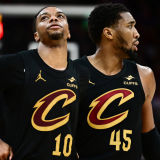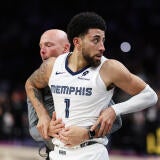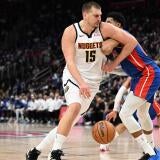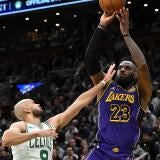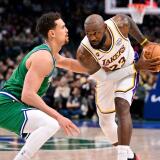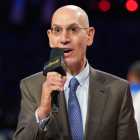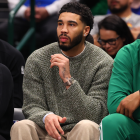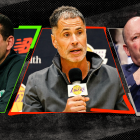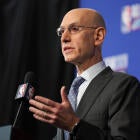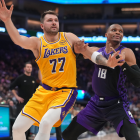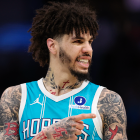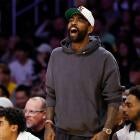Ranking all 30 NBA head coaching jobs right now: Why Lakers are near bottom and Dan Hurley was right to say no
Los Angeles has a below-average coaching job to offer

When Dan Hurley passed on the Los Angeles Lakers, it sparked a debate about the job that the NBA's marquee franchise was actually offering. The Laker brand remains strong, but, in practical terms, is the job especially desirable beyond that? Multiple league sources that spoke to CBS Sports' Matt Norlander suggested that it wasn't.
"That Lakers job isn't good," one source told Norlander. "It is not good. Anyone that's not in the NBA might not realize it, but the perception of the job is better than what the job is. It's not a good job. It's hard; the ownership group isn't flush with cash, and their front office hasn't proven they can build a roster. Moving forward, you can't even build up with three superstars because of the new CBA. You take LeBron and AD off that team, look at that roster. The team is horrible."
This raises several worthwhile questions. What exactly makes a good coaching job in the NBA? And which teams have the best, and worst, jobs for coaches right now? Below we're going to rank all 30 NBA head coaching jobs on their desirability. For the sake of argument, we will assume salary is not a factor. After all, we live in a world in which the Pistons are more willing to pay their top choice than the Lakers. Additionally, we will rule out market preferences as well. Those are going to vary on a case-by-case basis.
Instead, we'll judge which of the 30 jobs would appeal most to a typical coach on the basis of these six categories:
- How stable is ownership, and how involved is it in basketball decisions?
- Has ownership proven willing to spend on both players and off-court personnel?
- How stable is the front office, and what kind of track record does it have?
- How much job security does a typical coach with this team have?
- How talented is the roster, today, particularly when it comes to star-level players?
- How well-positioned is that roster for long-term success?
The teams at the top of this list check all six boxes or come relatively close. The teams at the bottom might not check any of them. So where do the Lakers fall, especially now that Hurley has said no? Let's go through all 30 teams and find out:
1. Oklahoma City Thunder
The Thunder are the only team in the NBA that would earn a perfect score here. Clay Bennett has owned the team for nearly two decades, but he's left basketball decisions in the hands of Sam Presti, whose track record is nearly spotless. The Thunder are remembered for letting James Harden go to save money, but don't forget, they paid enormous tax bills during the Russell Westbrook-Paul George era. They just earned the No. 1 seed in the Western Conference with a preposterously young roster. They have more draft picks than any other team in basketball. Presti hasn't fired a coach since Scott Brooks in 2015. Take the Thunder job and you're positioned to win now, win later and hold onto your job for the foreseeable future.
2. Boston Celtics
Boston is about to win its 18th championship, and while its market doesn't count in this exercise, that history of winning would surely appeal to plenty of candidates. The roster is dominant, and while it has some older role players like Jrue Holiday and Al Horford, the Jayson Tatum-Jaylen Brown core is relatively young and should keep the Celtics relatively competitive for years to come. Wyc Grousbeck has never fired a coach that he hired for on-court reasons (the Ime Udoka situation was unique). He stuck with Doc Rivers through his first three tumultuous seasons (he went 102-144 in that span) long enough to see him grow into a championship coach. Brad Stevens may not have gotten a single significant move wrong since getting promoted to general manager. Long-term luxury tax concerns are the only thing to worry about in Boston. The Celtics are just further along in their contention window than the Thunder, so it's a shorter runway. But Boston has the NBA's best roster. It is a coach's dream.
3. Denver Nuggets
The Celtics have the NBA's best roster. The Nuggets have its best player, and Nikola Jokic is still only 29 and never gets hurt. He's the second-oldest Nuggets starter, so this team should be in the hunt for several more years. The Nuggets were comfortable with Michael Malone missing the playoffs in his first three seasons, so job security would be reasonable. Ownership has tended to stay out of basketball matters, but it isn't known for spending either. The Nuggets let both Masai Ujiri and Tim Connelly get away. They don't have a dedicated practice facility, and they didn't get a G-League team until 2021. Still, ownership has spent on the luxury tax so far in this era, and while Calvin Booth may be relatively new to the job, his first season led to a title, and Denver has such a strong track record of developing general managers that his future appears bright.
4. San Antonio Spurs
You could make a compelling case for the Spurs at No. 1. They have nearly as much draft capital as Oklahoma City, and Victor Wembanyama is the best long-term prospect in the NBA. San Antonio's ownership is well known for staying out of basketball matters, and while Brian Wright may technically be the general manager now, his predecessor, star executive R.C. Buford, is still with the organization (and perhaps, depending on how you want to define this exercise, Gregg Popovich could be as well in a front office role as he technically retains final say on moves). No team has done a better job of incubating future basketball innovators than the Spurs, and our No. 1 team, the Thunder, is effectively a San Antonio offshoot. Popovich has coached the Spurs since roughly the Truman administration, so job security here is strong. The only thing keeping San Antonio out of the top three is the general uncertainty that comes with youth. We know where the Spurs are going... but they aren't there yet. We don't quite know what these young role players will become or how they'll use all of these draft assets. Someone is going to do a whole lot of winning in San Antonio with Wembanyama, but the slight fear a new coach might have would be winning enough early on to ensure that it would be him.
5. Dallas Mavericks
The Mavericks are the ultimate example of how fluid a list like this can be. A year ago, it looked like they might lose Luka Doncic without a bounce-back season. Now they're in the NBA Finals. Doncic has a winning roster filled with young players that should keep the Mavericks competitive even after Kyrie Irving ages out of stardom. Nico Harrison has solidified himself as a strong general manager by drafting Dereck Lively and trading for P.J. Washington and Daniel Gafford. Most of the questions here relate to the ownership situation. Mark Cuban seemed like one of the most stable owners in basketball until a few months ago. Then he sold the team. We know very little about how Miriam Adelson will operate as a governor or what the exact terms of her partnership with Cuban look like. Cuban nominally controls basketball operations, but will he have the freedom to pay the luxury tax consistently? How would a dispute between him and Harrison be solved? We'll likely learn more in the next few years. It's a reasonable concern, but otherwise, the Mavericks are in very good shape.
6. New York Knicks
Yes, James Dolan has historically been a major concern, but he's stayed out of Leon Rose's way since he hired him in 2020. As an uninvolved owner, his willingness to pay the tax and shell out for top talent behind the scenes becomes a major asset. Speaking of Rose, his track record is nearly spotless in New York. If there's a major mistake here, it was drafting Obi Toppin over Tyrese Haliburton, but that one worked out just fine as it kept the point guard spot open for Jalen Brunson. The Knicks now have one of the NBA's deepest rosters. Virtually everyone is either currently underpaid or was when they were acquired. New York still has plenty of tradable draft capital. The miles Tom Thibodeau has already put on his best players are always a concern, but any new coach could mitigate those concerns by immediately instituting a more traditional rotation.
7. Orlando Magic
The Magic had one of the NBA's youngest rosters last season, but still had one of its best defenses. That is extraordinarily rare, and it's what coaches dream about. Orlando is headed for significant cap space this offseason, and with all of its own draft picks still tradable, the Magic can easily find the offensive upgrades they'll need moving forward. Paolo Banchero is a viable franchise player. Ownership has largely stayed out of basketball operations, and job security has been quite strong on the front office side. Jeff Weltman went .500 or better in just one of his first six seasons, but stuck around long enough to see his vision through. They've been a bit trigger happy with coaches, notably firing Scott Skiles after one year and Frank Vogel after two, but Weltman didn't hire either of them. Your real concern here is that six-year run before Banchero emerged as a star. Orlando was fairly directionless before winning the No. 1 pick. Now, the Magic have a defined style in that they almost always emphasize long, athletic wings above all else, but it's entirely possible that without help from the lottery gods, Weltman and John Hammond would be gone by now. Still, they've made the most of the opportunities presented to them lately, and the result is a very promising young team.
8. Philadelphia 76ers
The 76ers are a general manager's dream, but not necessarily a coach's. Their roster at this moment is more or less just two stars: Joel Embiid and Tyrese Maxey. Everything else is a mystery. Coaches tend to prefer certainty. Fortunately, Daryl Morey is one of the NBA's most creative executives. He can be trusted to make the most of Philadelphia's cap space, and as far as job security goes, it's worth noting that no Morey team has ever gone below .500. Philadelphia's ownership was willing to pay Tobias Harris the max. Spending won't be an issue, and Josh Harris is noted for hiring top executives and letting them do their job. Aside from the uncertainty surrounding the roster, the biggest fear here would be Embiid's injury history. He ends almost every postseason hobbled, and it's unclear how much longer his body will be able to hold up at an MVP level. Having Maxey mitigates some of that risk. There are pivots available to Philadelphia for now, though an all-in offseason may take those off of the table. Embiid is simultaneously this job's selling point and its biggest risk.
9. Miami Heat
The Heat have had as many coaches this century as the Bucks have had in the past two seasons. There isn't a more stable organization in basketball, and even if you're worried about Pat Riley's age, the Heat do an incredible job of keeping their front-office talent in-house. Well-known executives like Adam Simon and capologist Andy Elisburg are more than ready to run a team, and ownership has proven with Riley that it won't interfere in most basketball matters. Spending is a bit more of a concern. The Heat have paid the tax, but only to a point. They notably bothered LeBron James in 2013 when they waived Mike Miller to save money. The roster is also in a state of flux right now, as Jimmy Butler's quest for an extension may eventually lead to a trade. Still, the Heat managed to pull Butler of thin air in 2019 when they had basically no assets or cap flexibility. They found Bam Adebayo at the end of the lottery and have developed countless undrafted free agents. A new coach could absolutely trust the Heat to get the roster right even if it's not immediately clear as to how they'd do so.
10. Memphis Grizzlies
The Grizzlies had an argument for the top five a year ago. They earned back-to-back No. 2 seeds with a core of players in their mid-20s. They have an owner whose personal wealth has skyrocketed since buying the team and a general manager whose draft record is arguably the best in the NBA over the past half-decade. They still control all of their own draft picks. But man, the Ja Morant situation is scary. Hopefully he's put his off-court problems behind him, but he's the face of the franchise, and while Memphis' other highly-paid youngsters (Jaren Jackson Jr. and Desmond Bane) are excellent fits playing off of Morant, neither is suited to lead a team themselves. This is a very impressive house of cards. It all falls down if Morant does. Everyone involved has so much invested in him that he'll probably keep it together long enough for this team to reach its potential, and that makes this an attractive job. But it's the riskiest one in the top 10.
11. Minnesota Timberwolves
How are the Timberwolves outside of the top 10 when they have one of the NBA's best young players and a roster that just reached the Western Conference finals? Well, for starters, we don't know who the owner is going to be, and neither option is all that attractive. We don't know who the general manager is going to be either. Connelly had an opt-out after this season. He delayed it a year recently, but can still walk after next season, and given the mounting tax concerns here, he may well do so if he isn't satisfied with the resolution of the ownership situation. Having Anthony Edwards, by himself, makes this an above-average job. He's good enough and young enough by himself to warrant that placement, and this team is good enough to win it all next season if it's held together. But there's just too much uncertainty to call this a top-10 job.
12. Indiana Pacers
The Pacers are among the more stable teams in basketball. They've had three top basketball executives since 1987: Donnie Walsh, Larry Bird and Kevin Pritchard. Herb Simon had a quick trigger with coaches early on, but aside from Nate Bjorkgren, he's largely employed coaches for reasonable durations in recent years. Tyrese Haliburton is a worthy face of the franchise. The rest of the roster is young aside from Pascal Siakam, and by the time his age does become an issue, the Pacers will have recouped enough picks to pivot. They just made the Eastern Conference finals, and even if that says more about the conference than them, it's not as though they're moving out West next year. The concern for the Pacers is budgetary. Larry Bird reportedly stepped aside out of frustration with Simon's penny-pinching. Indiana hasn't paid the luxury tax since the more punitive format was introduced in 2011. They still have some time before that becomes a necessity, but if the Pacers are going to win long-term, they eventually going to have to ante up. Doubt over their willingness to do so limits Indiana's upside, but the Pacers almost never tank. This team has missed the playoffs only nine times since 1990. A worthwhile coach should always be reasonably competitive in Indiana.
13. New Orleans Pelicans
The Pelicans are the championship contender hiding under our noses. From Dec. 1 on, the Pelicans had the NBA's fourth-best net rating and sixth-best record. David Griffin has actually built a champion in Cleveland, and the Pelicans are still flush with draft capital and youth after trading away Anthony Davis and Jrue Holiday early in his tenure. New Orleans can still build almost any kind of roster it wants. The issues are related to sustainability. Zion Williamson's health is a glaring red flag. So is the team's balance sheet. With new contracts for Brandon Ingram and Trey Murphy due at the end of next season, the Pelicans will be a deep luxury tax team without changes. The Pelicans have never paid the tax. Period. Not before the 2011 rule changes or after it. There's still so much upside here in terms of the existing talent and the assets available to make changes that this remains a very high-upside job, but the risks are perhaps scarier here than they are for any other team we've covered so far.
14. Golden State Warriors
Congratulations, you've unlocked infinite money mode. The Warriors have paid roughly $600 million in luxury taxes over the past four seasons. Forbes estimated that they earned $765 million in revenue last season. The second-place Lakers earned an estimated $516 million. You'll never have to worry about paying players or staff in Golden State. Everything is top of the line with Joe Lacob. The front office is in a bit more flux now that Bob Myers works for ESPN, but Golden State's process has always been fairly collaborative and more able to sustain the loss of a key figure than most teams. Stephen Curry is still an All-NBA player, but obviously, there is real long-term fear about paying him, Draymond Green and Klay Thompson. Still, the Warriors have most of their long-term draft capital, and there's youth to work with here (Jonathan Kuminga, Brandin Podziemski, Moses Moody and Trayce Jackson-Davis). This is a high-pressure job, and Lacob is more involved than most owners, but there's enough talent to be competitive now and enough maneuverability to figure out the long haul even after the Warriors abandoned their two-timelines scheme.
15. Cleveland Cavaliers
Cleveland doesn't quite have Golden State's financial resources, but Dan Gilbert's pocketbook has been a valuable weapon for the Cavaliers for years now. He paid four straight years of tax bills upon LeBron James' return in 2014, and perhaps more pertinently here, has paid several coaches at a time at multiple points. This is, of course, a double-edged sword. Gilbert has employed seven head coaches since he bought the team in 2005, and that doesn't include the second stint Mike Brown served during the 2013-14 season. Job security in Cleveland has mostly been a myth, though Koby Altman's lengthy tenure as general manager is a bit reassuring. As far as the roster is concerned, we await word on Donovan Mitchell's future. If he's sticking around, the roster is in a relatively healthy place. A Mitchell-Evan Mobley duo is a solid foundation, and even if you'd need to find new homes for Darius Garland and/or Jarrett Allen just to balance out the roster, you'd get healthy returns for both. If Mitchell stays, winning in Cleveland is viable. If he leaves? Well, things get harder. Garland would benefit from playing without another high-usage ball-handler, but he's just not as talented as Mitchell is. The Cavs could be competitive with Garland as their point guard. But Mitchell is the key to their championship upside, and his future is uncertain.
16. Utah Jazz
The Jazz and Rockets are in somewhat similar positions. Neither has a true face of the franchise type, but Lauri Markkanen is the only proven All-Star on either side. Both have extra picks to wield in trades, but Utah's war chest is deeper. Both have rich owners, but Ryan Smith doesn't have quite as much of a track record for involvement on the basketball side, instead trusting Danny Ainge, a far more proven general manager than Rafael Stone, to run the team. Job security in Utah is strong, as the Jazz have had only six full-time coaches since moving to Salt Lake City in 1979, but Smith didn't own the team for most of that run. For the Jazz job to rise to the top half of this list, Ainge probably needs to pick a direction. Either trade Markkanen now, fully embrace a rebuild that never quite came and load up for the stellar 2025 NBA Draft, or go the other way and use some of that draft capital to meaningfully improve the team. Those picks represent Utah's upside, but until we know how they're used, the Jazz are only a promising job, not necessarily a great one.
17. Houston Rockets
The Rockets are a bit of a mystery box at this point, but a promising one. Alperen Sengun and Jalen Green have both had All-Star-caliber stretches, but neither is a proven franchise cornerstone. The young talent beyond those two is unproven but exciting, especially Amen Thompson. If he ever learns to shoot, he's going to be the best player in this core. Houston owes some of its own picks to the Thunder, but makes up for it by controlling Brooklyn's first-rounders through 2027. The books are relatively clean, and while Tilman Fertitta is known to meddle in basketball manners and was relatively cheap in his first few years owning the Rockets, he's gained significant personal wealth since then and figures to be capable of at least paying the tax should the need arise. Rafael Stone may have taken an untraditional route to running the Rockets front office, but he's handled the role well since then. Ultimately, this job's upside is tied to Houston's ability to find a superstar. The Rockets don't have an heir to James Harden as the face of their franchise, but they have the tools to find one. If they do? This becomes a much better job.
18. Milwaukee Bucks
The good news? You have an MVP, an All-Star and two franchise cornerstones from the last champion in place. A championship roster can still be built around Giannis Antetokounmpo, Damian Lillard, Khris Middleton and Brook Lopez, even if that quartet is getting distressingly old. The bad news? Well... everything else. The Bucks are more or less out of tradable draft capital. They're a repeater tax payer that doesn't figure to get cheaper any time soon. They've fired two coaches in the last year. Jimmy Haslam just bought Marc Lasry's 25% stake in the Bucks, but Milwaukee's unusual ownership structure shifts governorship of the team every five years. His track record with the Cleveland Browns is not encouraging. There is virtually no young talent in the building. Jon Horst reportedly considered trying to jump to the Detroit Pistons this offseason. The building hasn't exactly burned down yet... but we can see smoke. This team has another year or two left, max, and at that point, it becomes one of the NBA's worst jobs. But the championship shot you get in those first two years? That keeps the Bucks out of the bottom 10.
19. Sacramento Kings
Few teams have been as volatile from a coaching perspective as the Kings. Vivek Ranadive bought the team in 2013 and has employed six full-time coaches since. Some deserved to be fired. But Michael Malone lost his job because of a losing streak that came when DeMarcus Cousins had viral meningitis, and Dave Joerger lost his job despite posting the best season the Kings had seen in over a decade. Couple those firings with the tense extension negotiations between the Kings and Mike Brown and, well, it certainly seems as though Ranadive considers coaches to be somewhat disposable. That's obviously not a great start here, but the situation is otherwise promising. There are two stars here in De'Aaron Fox and Domantas Sabonis, and both are in their 20s. The Kings have most of their picks to work with, and the front office has reportedly been aggressive in seeking upgrades. Monte McNair won Executive of the Year after the 2022-23 season. The upside here is somewhat limited. Fox and Sabonis are All-Stars, but not the sort of top-10 players that typically carry champions. The rest of the roster would have to be flawless to seriously contend. That's a tough needle to thread.
20. Los Angeles Lakers
When you take market and history out of the equation, what do the Lakers really have over the Kings? They've been just as volatile, as they are looking for their seventh head coach since Phil Jackson retired in 2011, and they've had less reason to fire that many coaches. Frank Vogel won the championship and still got fired after three years. They only offered Ty Lue a three-year deal in 2019. Darvin Ham lasted two years after reaching the Western Conference finals. Does coaching a team that effectively lives in perpetual "championship or bust" mode sound especially fun? Not really. LeBron James and Anthony Davis are better than Fox and Sabonis, but they're a good deal older as well. James turns 40 next season. Davis turns 32 before opening night. The two of them combined to miss only 17 games last season and the Lakers were still only a 47-win team. How do they look in a deeper Western Conference if James and Davis miss something closer to the 60 or so they averaged in the previous three seasons? Austin Reaves is a young starter on a cheap contract. He's not the sort of young player you can pin your long-term hopes on. His upside is likely lower than Keegan Murray's, a No. 4 overall pick with better physical tools. The Lakers can try to upgrade the roster this offseason, but they've spent more of their draft capital than the Kings have. The Lakers have paid the tax three years in a row, but they as Norlander's source suggested, this isn't a team known for behind-the-scenes spending. Rob Pelinka won a championship largely because his plan to lure Kawhi Leonard failed and he was forced to sign the 3-and-D players that remained on the market. He's spent the past four years since then taking the roster further and further away from that model with sometimes-disastrous results. When was the last time the Kings made a trade as bad as the Russell Westbrook deal? Having James and Davis is appealing for the same reasons having Antetokounmpo and Lillard in Milwaukee is. Having two stars at that level theoretically opens a championship window. But the Lakers don't have anything like Middleton or Lopez, and if they trade their picks to improve, they'll have no easy way of rebuilding when the James and Davis era ends. All in all, this is a job that sets coaches up to fail. If Vogel couldn't keep it after winning a literal championship, why should any other option feel safe?
21. Los Angeles Clippers
The Clippers have more short-term championship equity than the Lakers do. That 26-5 stretch they posted in December and January suggests this roster, as currently constructed, can win a championship if it stays healthy. The problem is that we have no reason whatsoever to assume it will stay healthy after four consecutive postseasons have ended in injury-related disappointments. Paul George isn't even a lock to stay, and with reporting so far suggesting that the Clippers haven't offered him the max, it's appearing likelier and likelier that he leaves. If he does, that championship equity goes out the door with him. The short term is all the Clippers really have, because they don't control any of their own first-round picks until 2030. Prudence against the second apron is sensible in most cases. The Clippers have no choice. They have to go for it now because the future is already ruined. The difference between them and the Bucks is that Milwaukee at least has their players under contract and just needs to work on the fringes. If George re-signs, the Clippers rise a few levels. If nothing else, Steve Ballmer's unlimited funds are a very valuable asset. The front office has largely targeted the right kinds of players since he took over as well. But if you're taking over a Clippers team without George and without any future draft picks to work with, you're setting yourself up to get fired in a few years when Kawhi Leonard and James Harden age out of relevance.
22. Brooklyn Nets
The Nets have a lottery-caliber roster. They don't control their own picks. They've now cycled through three head coaches in the past five seasons, and two of them lost their jobs for reasons that should scare potential new coaches. Kenny Atkinson lost his job because he didn't fit with Kevin Durant and Kyrie Irving, who reportedly wanted him to start DeAndre Jordan over Jarrett Allen, and then, even if the two weren't necessarily directly connected, Durant reportedly asked for Steve Nash to be fired in the 2022 offseason, which the Nets ultimately did early in the 2022-23 season. Still, Sean Marks has a fairly strong roster-assembly track record at least. He built a playoff team without his own first-round picks, and then he built a contender that arguably came one vaccine mandate away from having the 2022 championship favorite. The Nets have accumulated so many valuable future picks from the Phoenix Suns that missing their own picks doesn't necessarily have to ruin their future. They can use those picks to try to get a star if they want, or they can go the other way, hold them, trade Mikal Bridges for another bounty (possibly including their own picks from Houston) and set themselves up for one of the most promising rebuilds in the NBA. There's hope here, but there's also a lot of negativity.
23. Toronto Raptors
The good news? You get access to a young All-Star in Scottie Barnes, a former executive of the year in Masai Ujiri and the deep pockets of Maple Leaf Sports and Entertainment, the team's wealthy owners. The bad news? Ujiri has a bit of a history of moving on from successful coaches. He fired Dwane Casey after winning Coach of the Year, and Nick Nurse left after the 2022-23 season despite winning the championship in 2019. The roster doesn't exactly have a defined direction at the moment, either. They waited too long to trade OG Anunoby and Pascal Siakam, ultimately walking away with two young players that are about to get expensive in Immanuel Quickley and RJ Barrett as well as a sack of not especially valuable draft picks. The Jakob Poeltl trade was a disaster, and the Spurs have their lottery pick this year as a result. They let Fred VanVleet walk for nothing for reasons that remain unclear. Toronto still controls its future picks, so there are paths to improvement, but I'd need to know what exactly the plan is before committing to this job.
24. Phoenix Suns
Imagine if you could combine the relatively limited short-term championship equity that the Lakers have with the disastrous long-term outlook that the Clippers have. That, essentially, is where the Suns are right now. Unlike the Clippers, their three-headed star trio of Durant, Devin Booker and Bradley Beal never looked like a possible champion, but of their future first-round picks, they control only No. 22 this year and their 2031 pick seven years from now. They're hamstrung by the second apron. They have arguably the most meddlesome owner in the NBA in Mat Ishbia, who has fired head coaches in both of his two seasons at the helm (Monty Williams in 2023 and Frank Vogel in 2024). James Jones is the general manager, but it's not fully clear who is making decisions, and it's not even clear who they'd be better off relying on: Jones, a GM who has openly said he doesn't care about the draft, or Isiah Thomas, one of the worst GMs in league history, but a close friend and advisor to Ishbia. After their season ended, Ishbia said that 26 of 29 NBA GMs would trade places with the Suns. Turns out, this is actually the worst win-now coaching job in the NBA. Its only redeeming qualities are the hope that the talented but redundant star trio improve and Ishbia's seemingly endless willingness to spend money.
25. Charlotte Hornets
The next few teams are essentially blank slates: early-stage rebuilders with some promising young talent that could eventually go far with the right hand on the steering wheel. Whether you'd take Brandon Miller, Cade Cunningham or Scoot Henderson long-term is mostly a matter of preference, but the Hornets come out ahead here as a true blank slate. There's no baggage associated with anyone here. Rick Schnall and Gabe Plotkin are new owners who haven't done anything disastrous yet. Jeff Peterson is similarly new to the GM position. They don't outrank the Blazers and Pistons because these two can be relied upon. They do because they haven't done anything wrong yet.
26. Detroit Pistons
Tom Gores has the wealth to fund a winner, and he flashed it with the expensive contract he gave Monty Williams last offseason. But there are real concerns over the front office dynamics at play here. Before Trajan Langdon was hired as the new president of basketball operations, it wasn't clear who was actually controlling basketball operations. Was it general manager Troy Weaver? Vice chairman and former player agent Arn Tellem? What sort of front-office power did Williams land in contract negotiations last offseason? Cade Cunningham is a future All-Star. The issue behind him is that most of Detroit's remaining young assets don't really fit around him. We've all made jokes about this team having too many centers. Neither Jaden Ivey nor Ausar Thompson, drafted to be perimeter fixtures around Cunningham, are reliable shooters. This team, as a whole, badly needs a shooting injection. This team could trade its way into a more interesting roster given the assets at hand, but without knowing who exactly would be making the trades, it's hard to get too excited about this job.
27. Portland Trail Blazers
The Joe Cronin era has been eventful, but not especially telling about his acumen as an executive. The C.J. McCollum trade failed to yield a significant asset, and only time will tell on the Damian Lillard blockbuster. Henderson was the consensus pick at No. 3 last year, but his rookie season was a bit disappointing. The question marks here relate more to ownership. When Jody Allen inherited the team from her late brother Paul, his will stipulated that she sell the team. The NBA has not forced her to do so, and such a complex estate could take years to fully settle. The New York Post reported that Allen has engaged in "toxic behavior," though specifics were not offered beyond allegations of sexual harassment and smuggling by former bodyguards that settled out of court. Ultimately, without an experienced basketball executive or a dependable roster, the ownership situation is too concerning for the Blazers to have an especially appealing job at the moment.
28. Atlanta Hawks
Hey, speaking of teams with uncertain front offices, let's check in with the Hawks. Landry Fields nominally controls basketball operations, but Quin Snyder likely secured some degree of input when he took the job, and Nick Ressler, the 28-year-old son of owner Tony Ressler, reportedly has taken on quite a bit of power within the organization. The Hawks have the No. 1 pick in June's NBA Draft, but that's a bit more of a curse than a blessing. There are no obvious top picks in this year's group, but there is inherent pressure to get that pick right. The Hawks have young talent, but unlike the teams above them, it is already getting paid. Trae Young is on a max deal. Dejounte Murray is on a veteran extension. Onyeka Okongwu and Deandre Hunter have already signed rookie extensions. Jalen Johnson is eligible for one this offseason. The upside here is limited. The Spurs control their next handful of picks. Interest in Young and Murray on the trade market has appeared tepid relative to expectations. This just isn't a very desirable job.
29. Washington Wizards
Behold, the blankest of the blank slates. Washington's brightest young prospect is Bilal Coulibaly, who averaged 8.4 points per game as a rookie. The Wizards got virtually nothing for Bradley Beal and Kristaps Porzingis and, as such, had to start their rebuild from square one. Job security used to be a certainty in Washington as Ernie Grunfeld reigned for 16 years, but his replacement, Tommy Sheppard, lasted only four, and new head of basketball operations Michael Winger didn't even let Sheppard's head-coaching hire, Wes Unseld Jr., finish out his second season before firing him. There isn't enough talent here for the books to be messy, but no team in the NBA would take Jordan Poole's contract now. Taking this job would essentially mean waiting for a future draft pick to pan out. There's just nothing to work with in Washington.
30. Chicago Bulls
I mean... what did you expect? The Bulls play in the NBA's third-biggest market and their team-building approach appears to be "win as many games as possible without paying the luxury tax." The team is built around two overpaid perimeter scorers, one of whom is 34 and will inevitably extract and inflated contract out of the Bulls in free agency, the other of whom already got one and can't stay healthy. The Bulls gave away two lottery picks for Nikola Vucevic, who is now on one of the NBA's worst contracts. They owe another pick to the Spurs next year for DeMar DeRozan. They've held Alex Caruso hostage for the duration of his well below-market contract because of their insistence on competing for the Play-In tournament, but that means they'll either have to trade him for less value than they could have gotten in the past or extend him at a number that might be shaky as he reaches his 30s. Coby White is really the only thing to get excited about here, but even though he nearly won Most Improved Player, he didn't even average 20 points per game. Jerry Reinsdorf happened to buy the team that employed a young Michael Jordan. Since he retired in 1998, Chicago is 936-1,121. They've won five playoff series in the past 25 years. There are cheap teams. There are poorly managed teams. The Bulls are the most lethal combination of both that exists in the modern NBA. Job security isn't even a certainty here. Yes, Billy Donovan has lasted four years without making any playoff noise, but Jim Boylen didn't even last two full seasons. Tom Thibodeau got fired after five seasons in which he never won fewer than 45 games. Vinny Del Negro only got two seasons. There's nothing to latch onto here. The Bulls are a bad organization and exactly the sort of job any serious coaching candidate should avoid.



